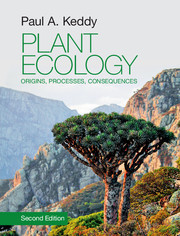Description
Plant Ecology (2nd Ed., Revised edition)
Origins, Processes, Consequences
Author: Keddy Paul A.
This book presents a global and interdisciplinary approach to plant ecology, guiding students through essential concepts with real-world examples.
Language: English
Subject for Plant Ecology:
Approximative price 73.88 €
In Print (Delivery period: 14 days).
Add to cart
Publication date: 04-2017
624 p. · 19.8x25.5 cm · Hardback
624 p. · 19.8x25.5 cm · Hardback
Description
/li>Contents
/li>Biography
/li>
Presenting a global and interdisciplinary approach to plant ecology, this much-awaited new edition of the book Plants and Vegetation integrates classical themes with the latest ideas, models, and data. Keddy draws on extensive teaching experience to bring the field to life, guiding students through essential concepts with numerous real-world examples and full-colour illustrations throughout. The chapters begin by presenting the wider picture of the origin of plants and their impact on the Earth, before exploring the search for global patterns in plants and vegetation. Chapters on resources, stress, competition, herbivory, and mutualism explore causation, and a concluding chapter on conservation addresses the concern that one-third of all plant species are at risk of extinction. The scope of this edition is broadened further by a new chapter on population ecology, along with extensive examples including South African deserts, the Guyana Highlands of South America, Himalayan forests and arctic alpine environments.
Preface; 1. Plants create the biosphere; 2. The search for global patterns; 3. Resources; 4. Competition; 5. Disturbance; 6. Herbivores; 7. Positive interactions; 8. Time; 9. Populations; 10. Stress; 11. Gradients and plant communities; 12. Diversity; 13. Conservation and management; Questions for review; References; Glossary; Index.
Paul A. Keddy has taught plant ecology for more than thirty years. He is often a conference keynote speaker, and delights in bringing science alive for his audience. Dr Keddy's research explores environmental factors that control plant communities and their manipulation to maintain and restore biodiversity. His awards include a National Wetlands Award for Science Research, the Lawson Medal and Gleason Prize for Competition, and his first edition of Wetland Ecology (Cambridge, 2000) won the Society of Wetland Scientists' Merit Award. He has also advised organizations including World Wildlife Fund, Earthjustice, and The Nature Conservancy.
© 2024 LAVOISIER S.A.S.




